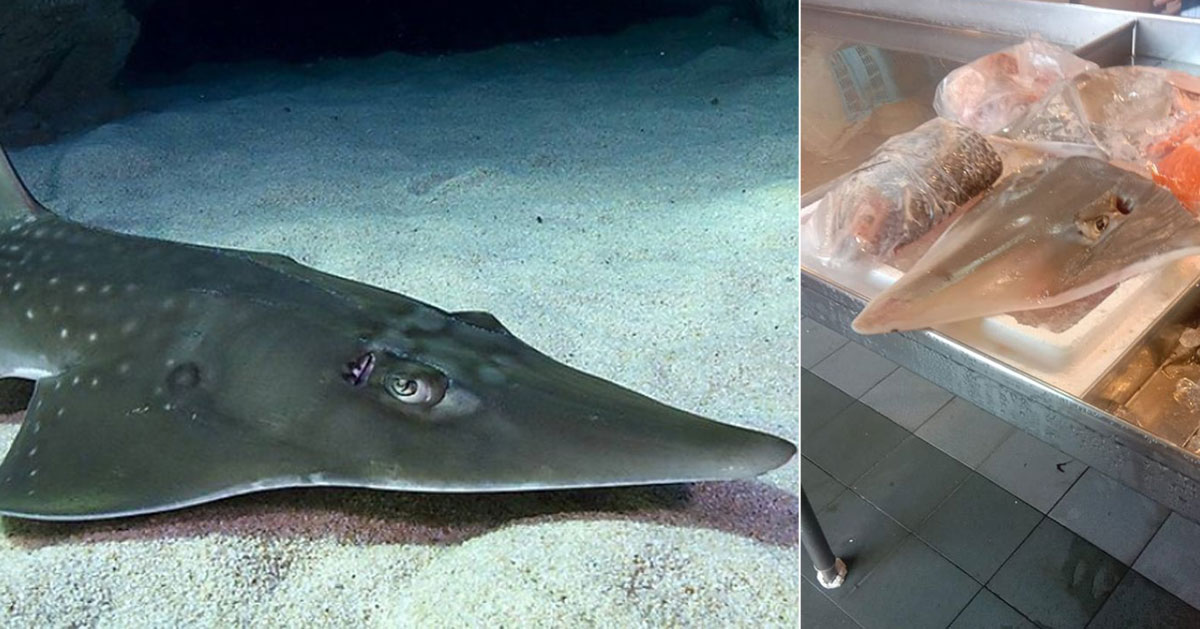The critically endangered shovelnose ray appears to be sold in markets in Choa Chu Kang and Bukit Gombak.
Photos of fish taken at the markets in Singapore were by one of the volunteers of Marine Stewards, which was put up in a Facebook post on Feb. 18.
The nonprofit group promotes marine conservation and sustainable fishing in Singapore.
What is a shovelnose ray or a wedgefish?
As demand for shark's fin drops, another fish classified as a ray, has found itself in trouble.
The shovelnose ray or wedgefish, is a type of fish that has been classified as "critically endangered" by the IUCN Red List of Threatened Species.
It is used in soups or dishes and referred to as "shark's head".
This is not the first time wedgefish have been photographed on sale in Singapore.
In 2019, a Twitter post highlighted a photo taken at a local fishery port which featured the creatures.
#RhinoRays are the world's most threatened marine fishes - finds @IUCNRedList & @IUCNShark. Like many other rays and #sharks, they have relatively low reproductive rates, leaving them especially susceptible to #overfishing. pic.twitter.com/KtfVEaA9nK
— IUCN SSC Shark Specialist Group (@IUCNShark) July 18, 2019
More information on the ray can be found here:
Critically endangered fish still found in markets in S'pore
In a post by Marine Stewards, the group posted photos of the endangered shovelnose ray, amongst other sharks for sale in Singapore.
A spokesperson from Marine Stewards told Mothership that the fish captured in the photos looks like a Rhynochobatus australiae, but cannot be confirmed as only a portion of the head is seen.
The shovelnose ray is currently listed in the Convention on International Trade in Endangered Species of Wild Fauna and Flora (CITES) Appendix II, which restricts international trade of the species.
According to the post, the pictures of the fish were taken at Choa Chu Kang market and Bukit Gombak Market over the past weekend.
The group is looking for volunteers to join their taskforce
Marine Stewards highlighted in their post that the fish are entering Singapore through the following loopholes:
- Imported under a generic name, such as "ray", or the wrong name instead of the actual species name which is restricted
- Caught by a commercial fishing vessel with a local-flag
- Imported with a CITES license
To close the current loopholes, the group run by volunteers is looking for members to join their taskforce.
If you live near Boon Lay or Jurong East and Senoko Fishery Port and are able to dedicate late nights to surveying the fishery ports or if you are able to do research, do contact them here.
Letter of warning issued to merchant: NParks
As Singapore is a signatory to CITES, the implementation and enforcement of CITES regulations is carried out by National Parks Board (NParks).
In a statement from NParks on Feb. 21, 2020, Adrian Loo, the Group Director of Conservation at the National Parks Board, told Mothership:
NParks is aware of the reports and investigations are underway. NParks has been visiting fishery ports and have issued advisories on the imports and sales of rays, and have informed the merchants on the penalties for non-compliances. There could be occasional bycatches containing CITES-listed rays by fishing vessels. Nonetheless, NParks will not permit the import and/or sale of these species if they are brought into Singapore without CITES permits. We will be briefing the merchants at these ports again on regulations of CITES-listed species.
In an update on Mar. 5, 2020, NParks told Mothership:
After receiving feedback about the sale of shovelnose rays at wet markets in Choa Chu Kang and Bukit Gombak, the National Parks Board conducted thorough investigations on the matter. During the investigations, several shovelnose rays were confiscated from the fishery port. A letter of warning was issued to the merchant as the CITES listing only recently came into effect in November 2019 and the merchant was a first-time offender. Wet markets at the heartlands were also inspected to ensure no rays were on sale. Advisories on the import and sales of rays have also been issued during these visits and a second round of briefing was given to the merchants at the ports on 25 Feb 2020.
In investigations by NParks, shovelnose rays were confiscated from the fishery port and the merchant was issued a letter of warning.
If a person is caught in Singapore for the illegal import, export and re-export of any CITES-listed species, they can be charged under the Endangered Species Act.
The penalty is a fine of up to $50,000 for each such scheduled species (but not exceeding a total of S$500,000) or jail of up to two years, or both.
Helplines to report the endangered fish in our markets
Members of the public can report any sightings of the fish in our local fishery ports, markets, retail stalls or online through the following channels:
- NParks: 1800-471-7300 or www.nparks.gov.sg/feedback
- Marine Stewards: [email protected]
Information shared with NParks will be kept strictly confidential.
Top photos from Marine Stewards' Facebook page and website
If you like what you read, follow us on Facebook, Instagram, Twitter and Telegram to get the latest updates.
